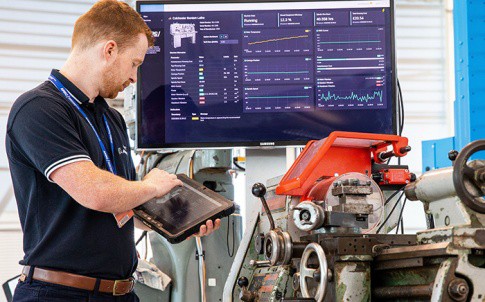Given the sometimes confusing plethora of digital technologies available, and the competing – and even contradictory – claims about their effectiveness, it can be difficult to keep in sight the reasons for using them. The roundtable panellists had a variety of points of view on this, mainly foregrounding the abilities that technologies give for keeping the performance of factories simple to observe, and keeping in sight the improvements they can bring to the final product...

For some, investment is not justified unless its advantages can be quantified. MTC’s digital strategy lead, Dr Lina Huertas, said some examples from around the world suggest that investment in technology can improve productivity by up to 30 per cent, as well as generate “hundreds of thousands of jobs”.
Paul Perera agreed and said that investment in technology is a matter of urgency if the UK is to compete on the world stage, particularly for the country’s SME base. “We've got competitors in Korea who are buying robots at the rate of 10 or 20 times what we are in the UK, if not more,” he said. “If we don't accelerate the use of digital, some SMEs will be out of business, because some countries around the world are taking their SMEs further and faster.”
For BAE Systems, digitalisation allows the advantages of other technologies to be unlocked. “AI will enable us to use machine optimisation and design, give us the ability to think about the internet of things and get sensing into products and therefore design digital twins and use those the right way,” said BAE’s strategic technology director Andy Wright.
Meanwhile, Sophie Jones – general manager of additive manufacturing firm Added Scientific – put the advantages into a broader context, and said investment in manufacturing technology will be key to developing the Tomorrow’s World type of innovations that will open up new markets for the UK and shape society in the future. “I don’t think we’re going to get to the products unless we develop the manufacturing technology,” she said. “For me, the benefit is not in manufacturing technologies, it’s in the completely overhauled healthcare system and the completely overhauled positioning systems – and helping the UK assume a leading position in developing and delivering those – that I see as the benefit.”
Case study: From tier ones to SMEs

Engineers at BAE's Samlesbury site are trialling a smart cobotics workstation developed in collaboration with researchers from AMRC’s Factory 2050. The technology allows workers to make strategic decisions while delegating repetitive, machine-driven tasks that require consistency to the cobotic arm.
As well as a so-called “skills passport” that recognises operators and automatically loads optimised individual profiles using wireless technology, the smart workstation also features light-assisted assembly, which uses “pick by light” technology, prompting the user towards the correct components or consumables during the manufacturing process.
Dave Holmes, manufacturing director at BAE Systems’ Air business, said: "Cobotics is the next natural step in developing manufacturing technology that will allow for a blending of skilled roles. We envisage that people will make larger, more strategic decisions while delegating the repetitive and intricate aspects of production to a robot.”
In an illustration of how future factory technologies aren’t just for the big players, AMRC has also been working with Tinsley Bridge, a Sheffield SME, on the development of an Industry 4.0 demonstrator that can be retrofitted to existing manufacturing equipment.
“Using edge computing devices retrofitted to the company’s CNC machines, we have collected power consumption data during the production of automotive suspension components,” explained Rikki Coles, AI project engineer for AMRC’s Integrated Manufacturing Group at Factory 2050. “It isn’t a complicated parameter to measure on a CNC machine, but using AI and machine learning, we can actually do a lot with such simple data.”
The director of engineering at Tinsley Bridge, Russell Crow, said: “Interrogating our machine utilisation rates means we have better visibility of what was being manufactured and when, and the ability to assess if we are scheduling effectively. This data will allow us to look at boosting our productivity on the shop floor.
“Rather than investing in significant cost and time for new digitally integrated smart machining centres, we were able to work with the AMRC to retrofit our existing capabilities to achieve the same results.










UK Enters ‘Golden Age of Nuclear’
The delay (nearly 8 years) in getting approval for the Rolls-Royce SMR is most worrying. Signifies a torpid and expensive system that is quite onerous...